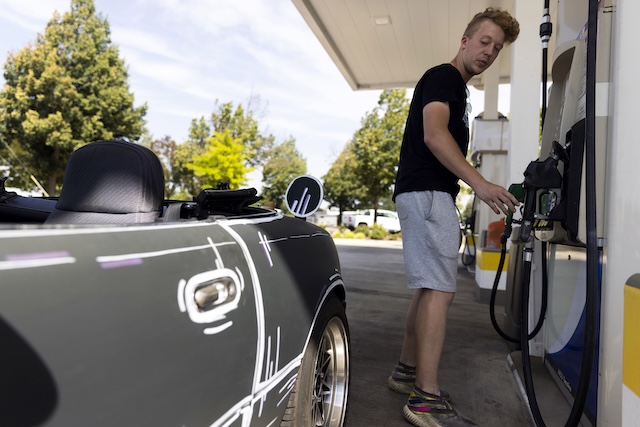Editorial: The simple reason so few Oregonians sign up for road use charge
Published 9:00 am Friday, August 1, 2025

- A driver prepares to pump his own gas in 2023 in Eugene. (AP Photo/Jenny Kane)
So we did it. We are putting a car where our editorials are, or at least trying to.
We signed up for OReGO, the state’s road user charge program.
It’s something that all Oregonians may have to do in the future. The program is designed to replace the gas tax, because so many cars get better and better gas mileage or don’t use gas. If you sign up for OReGO, you pay 2 cents a mile. Oregon’s gas tax is 40 cents a gallon.
Trending
We have advocated that the Legislature should encourage/compel more Oregonians to switch. We signed up to see what it was like. We can’t say we were looking forward to it, but, you know, for science!
We called the OReGO program and identified ourselves as a journalist, which we thought was the only fair way to do it. It could change the way the program responds to us, though. Then we marched ahead with signing up.
There were two contractors available, NextMove and GeoToll. We think the state’s website should give a side-by-side comparison of their differences. It does not. The website is being revised, so maybe that will be part of it.
We chose NextMove. That is not an endorsement.
The sign-up process was similar to signing up for anything online. Enter personal information. Set up another password to remember, oh joy. Enter a credit card. There were several pages of legal notices to read, including a provision that arbitration will be used to settle disputes.
We had to supply the VIN number of our vehicle. And spoiler alert, we messed that up.
Trending
The VIN is, in part, so the vehicle type can be identified. The state says a vehicle “must be registered in Oregon as a light-duty passenger vehicle. We accept electric, hybrid, diesel and gas-powered vehicles rated at 20 miles per gallon or better.”
The Subaru chosen has a gasoline engine and should qualify.
Once we signed up, we were not immediately admitted to the program. There is a check for eligibility. For one, the state checks that the person actually owns the vehicle or will soon own it.
We were denied. We transposed two of the VIN numbers. Oops. We think we got that straightened out.
We were looking to sign up for what we felt like would be the most invasive way to capture our miles driven. If we were accepted, we would be mailed a device to plug into our car that would automatically send out our mileage information, but not the location of the vehicle. We would still have to pay the gas tax at the pump, of course, because the gas tax still exists.
According to the calculator on ODOT’s website, we will probably pay more through OReGO, which did not give us a warm and fuzzy feeling on our journalist salary.
We had not realized many people who sign up for OReGO may end up paying more. There is a reduced vehicle registration fee for electric vehicles and vehicles that get more than 40 miles to the gallon. The Subaru is in neither category.
Our response will be to bike more, which falls right in line with state goals.
We will update editorial readers on what happens with this and if we decide to stick with it. The customer experience has been good. Paying more, well, nobody likes that. The Legislature may change the gas tax, registration fees and the road user charge during its August special session. That may change the calculus.
Only 823 vehicles are signed up for OReGO and now we better understand why.








